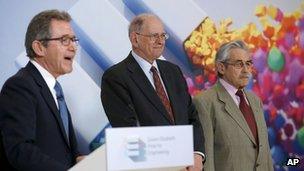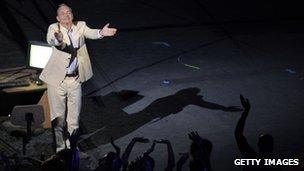Internet pioneers win engineering prize
- Published

Lord Browne (L) with Robert Kahn (C) and Louis Pouzin (R)
Pioneers of the internet are the first recipients of the Queen Elizabeth Prize for Engineering.
Sir Tim Berners-Lee, Robert Kahn, Vinton Cerf, Louis Pouzin and Marc Andreessen will share the £1m award.
The citation panel said the five men had all contributed to the revolution in communications that has taken place in recent decades.
The UK government initiated the QE Prize, external as a companion to the Nobels to raise the profile of engineering.
It is endowed by industry and administered by an independent trust chaired by Lord Browne, a former chief executive of BP.
The award was announced at the Royal Academy of Engineering in central London.
Sir Tim may be the best known of the winners, certainly in the UK. Working with others in the late 1980s, he helped develop the world wide web, which radically simplified the way information could be shared on the net.
Robert Kahn and Vinton Cerf provided the engineering insights that actually made the internet work. Their TCP/IP protocols define the way data travels around the internet.
Louis Pouzin helped work out how data should be labelled so that it reached the right destination.
Marc Andreessen is the man who developed Mosaic, the first popular browser for the web.
"The prize recognises what has been a roller-coaster ride of wonderful international collaboration," said Sir Tim.
"Bob and Vint's work on building the internet was re-enforced by Louis' work on datagrams and that enabled me to invent the web.

Sir Tim played a central role in the opening ceremony for last year's Olympics
"Marc's determined and perceptive work built on these platforms a product which became widely deployed across nations and computing platforms. I am honoured to receive this accolade and humbled to share it with them," he told BBC News.
The citation said the winners' contributions had not only changed the way we communicate but had spawned many new industries.
The men were commended for having the foresight to make their work freely available and without restriction. The internet and the WWW could not have taken off in the same way without this open approach.
It is said a third of the world's population now uses the internet. Some 330 petabytes of data are estimated to be carried across its servers each year - that's enough capacity to transfer every character ever written in every book ever published 20 times over, the citation said.
The chairman of the judges, Lord Broers, said: "The emergence of the internet and the web involved many teams of people from all over the world.
"However, these five visionary engineers, never before honoured together as a group, led the key developments that shaped the internet and the web as a coherent system and brought them into use."
Lord Browne said the group had "done an extraordinary service for humanity".
"I am delighted that the prize can honour the endeavours of these engineers, and make the story of their world-changing innovation known to the public," he added.
The Queen herself will present the winners with a trophy at Buckingham Palace in June.
- Published18 March 2013
- Published28 February 2012
- Published28 February 2012
- Published18 November 2011
- Published17 November 2011
- Published3 October 2012